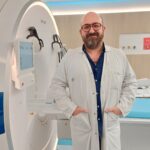HSP
The Hospital de la Santa Creu i Sant Pau is more than a healthcare center; it is a dynamic ecosystem dedicated to improving patient health. As a tertiary and high-complexity hospital, we provide top-quality, human-centered care, making us a benchmark in the healthcare sector.
Our institution is built on core pillars that define our mission and values. We lead medical advancements through our Research Institute, integrating the latest digital and technological innovations into patient care. By fostering innovation and digitization, we shape the future of medicine and support professionals in implementing new advancements.
Education is fundamental to our identity. Through the Learning Campus, which includes the Faculty of Medicine of the Autonomous University of Barcelona and the University School of Nursing, we provide top-tier training. Our campus embraces active learning methodologies, such as clinical simulations and skill-based training, to prepare future healthcare professionals effectively.
Sant Pau has a remarkable history, with over 600 years of medical tradition. Founded in 1401 through the merger of six hospitals in Barcelona, it remained the city’s primary healthcare institution for five centuries. As Barcelona grew, so did the hospital’s needs. Thanks to the legacy of banker Pau Gil and the architectural vision of Domènech i Montaner, a new modernist hospital was inaugurated in 1930. This UNESCO World Heritage Site became an emblem of Modernism.
By the late 20th century, growing healthcare demands led to the construction of a new hospital building, inaugurated in 2009. Throughout history, Sant Pau has continuously evolved to meet society’s changing needs while maintaining excellence in patient care.
Sant Pau is a national and European reference in specialized areas. In cardiology, we enhance chronic patient care with innovative public procurement projects. In neurosciences, we lead in diagnosing and treating Alzheimer’s, dementia, Parkinson’s, and movement disorders, and serve as a CSUR for rare neuromuscular diseases. In haematology, we were the first in Spain to produce and implement a CAR-T therapy for lymphatic cancer patients unresponsive to other treatments. We are the only non-U.S. hospital to receive the Geriatric Emergency Department Administration (GEDA) distinction for our emergency care model. Additionally, we are a national reference center for malignant mesenchymal tumors of the bone and soft tissue (Sarcoma).
Our outstanding work is reflected in our healthcare activity, driven by a team of over 4,200 employees. Each year, Sant Pau handles 36,251 admissions, 17,719 interventions, 136,526 emergency visits, 492,412 outpatient visits, and 84,515 day hospital sessions. Daily, this translates to 99 admissions, 49 interventions, 375 emergencies, 1,894 outpatient visits, and 325 day hospital sessions.
Sant Pau has been recognized as a CSUR in various specialized services, signifying its role as a referral center for complex pathologies and advanced procedures under national regulations (Royal Decree 1302/2006).
Today, we remain a leading institution, adapting to modern healthcare challenges with innovation, research, and education at our core. Our mission is to deliver the most complex treatments with the highest level of human care, ensuring that we continue to be a reference hospital for future generations.
Role in the project
Hospital Sant Pau is collaborating with Medtronic on Task T2.5, titled “Implementation and Validation of the Digital Interface for Patient Follow-Up,” as part of the SAFO (Smart Aneurysm Follow-Up) study. In this task, Sant Pau will contribute by adapting and validating Medtronic’s Get Ready solution to the Cerebral Aneurysm pathway. Additionally, the institution will be responsible for developing comprehensive training materials for both patients and clinical professionals (T4.4) and creating methodologies for effective change management as proposed by the platform (T5.3).
Furthermore, Sant Pau will also contribute to the development of methodologies for data collection and curation (T1.2 and T1.3).
Team
Josep Munuera

Dr Joesp Mumuera is a medical doctor (MD) and board-certified radiologist (EDiNR) since 2005, specializing in cerebrovascular imaging. He has held senior radiology positions at leading hospitals in Barcelona, including Vall d’Hebron, Hospital de Sant Pau, and Sant Joan de Déu.
Since 2012, he has combined clinical practice with healthcare management, serving as Head of the MRI Unit at Germans Trias i Pujol, Clinical Director of Strategy at the Catalan Institute of Diagnostic Imaging (IDI), and Head of Radiology at Sant Joan de Déu. In 2023, he became Director of the Radiology Department at Hospital de la Santa Creu i Sant Pau.
He holds a PhD on MRI biomarkers in stroke and has published over 90 scientific papers, 11 book chapters, and a pending AI-related patent. He leads the Advanced Imaging and AI Research Group at Sant Pau Research Institute and is the principal investigator in multiple national and European AI-driven medical imaging projects.
At Sant Pau, he also directs the AI3 Program, integrating AI into radiology workflows. A frequent speaker at international conferences, he has served as Scientific Director of the Spanish Society of Radiology (2020–2024) and is currently Vice President of the Catalan Society of Radiology
Caterina Sampol

Caterina Sampol is an Innovation Manager specializing in Demand-driven Innovation, Innovative Public Procurement, and Digital Transformation of Public Services. A mathematician by training, she has extensive experience in coordinating teams and European projects.
With over 35 years of experience in digital transformation across public safety, education, health, and emergency services, she has worked in innovation procurement since 2010. As Public Procurement Coordinator at AQuAS (2010–2016), she led major EU-funded PCP projects, including DECIPHER, ENIGMA, NYMPHA-MD, THALEA, and StopandGo.PPI. Since 2016, she has advised the Government of Catalonia on RIS3CAT Public Procurement of Innovation Programs, promoting SME participation in public tenders.
Since 2019, she has been the Public Procurement of Innovation Coordinator at Hospital Sant Pau, leading Value-Based Procurement initiatives and managing EU projects such as RITMOCORE and TIQUE. She also collaborates with VALDE Innova on ROSIA and CRANE PCP projects while driving R&D projects like CAT-CLinART, SEARCH, SHERPA, and ERIS.
She also collaborates as external expert with different EU funded programmes: COST, EU4Heath and Horizon. She also helped to plan and implement webinars and presented experiences in events and congresses either at national, regional or European level.
Daniel Benitez Garcia

Daniel Benizez Garcia is currently serving as a strategy consultant and innovation project manager at the Strategy, Innovation, and Transformation Office of Hospital Sant Pau, Daniel leads the development of new innovation opportunities for the hospital while managing the participation of the hospital in ongoing European projects, such as SEARCH (101172997), SHERPA (101194744), and TIQUE (965356), ERIS (101216605) in the fields of Advanced Medical Imaging and Cardiology.
He holds a degree in Biomedical Engineering from the Polytechnic University of Catalonia and a Master’s in Technological Innovation in Health from the University of Barcelona, Sorbonne Université in Paris, and EIT Health. Additionally, he has specialized in Healthcare Clinic Management at EUDE Business School and Medical Devices Regulation.
With expertise in open innovation, entrepreneurship, technology transfer, and European research and innovation projects in healthcare, Daniel has experience working across both the public and private sectors, always contributing to transforming the healthcare landscape through innovative approaches.
Lucia Borrego Escobar

Lucia Borrego Escobar is a Computational Imaging Scientist at the IA3 Department (Artificial Intelligence and Advanced Imaging) of Hospital Sant Pau in Barcelona. She plays a key role in the development and application of computational methods in biomedical imaging, contributing her expertise to projects at the intersection of artificial intelligence and clinical research. She is currently involved in the European innovation projects SEARCH (101172997) and SHERPA (101194744), focused on the integration of advanced imaging and AI in healthcare.
Lucia holds a degree in Biomedical Engineering from the Polytechnic University of Catalonia (UPC) and a Master’s in Computational Biomedical Engineering from Pompeu Fabra University (UPF). Her academic and professional background is rooted in the use of medical imaging technologies to address real-world clinical challenges.
With experience in computational imaging, machine learning, and image processing for biomedical applications, Lucia is passionate about translating technical innovation into clinical impact. She has worked on projects involving image segmentation, radiomics, and explainable AI.
Inés del Val Guardiola

Inés del Val Guardiola is a Computational Imaging Scientist at the Diagnostic Imaging Service of Hospital de la Santa Creu i Sant Pau, working within the AI3 Programme to integrate Artificial Intelligence into clinical radiology workflows. Her work focuses on the design, development, and implementation of computer vision and machine learning algorithms for medical images and clinical data.
She holds a degree in Biomedical Engineering and a postgraduate qualification in Artificial Intelligence with Deep Learning from the Polytechnic University of Catalonia, as well as a Master’s in Biomedical Computing from the Technical University of Munich, where she specialized in AI for medical applications.
With hands-on experience in model development and medical image analysis, Inés supports the technical execution of European research and innovation projects, including SEARCH and SHERPA. She works closely with clinicians and researchers to translate clinical needs into innovative, ethically responsible, and clinically valuable AI solutions.
At Sant Pau, Inés plays a key role in bridging the gap between clinical practice and advanced technology, contributing to multidisciplinary initiatives that aim to embed AI into hospital routines.
